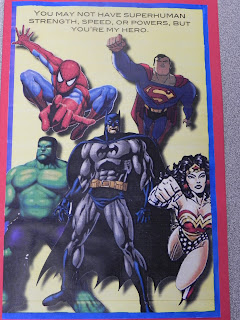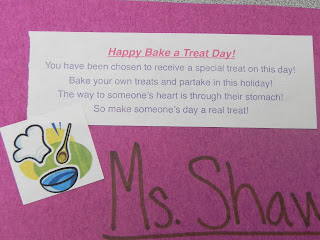Use the form attached to submit the URL to your Digital MG Project for your independent novel study.
Click HERE.
An inside glimpse of not only the in-class happenings of a high school English and Journalism classroom, but also the trials and tribulations, the successes and (unfortunately) failures, the excitement, and the processes by which these all occur.
Friday, March 30, 2012
Monday, March 19, 2012
The only thing you have to fear is...
What is so great about fear anyway?
How do you explain the desire of people to be terrified?
As children, we delight in ghost stories told in the dark. As adults, we read books or see movies that we know will scare us. Why?
The Freshman English class will be beginning a study of language and suspense through short stories. Authors such as Edgar Allan Poe, Jack London, and Shirley Jackson will be looked at, with students analyzing:
1) How do suspense and fear build upon the entertainment factor of reading?
2) What can we learn about people and human nature by locating the fears of characters?
3) How does setting build suspense and move the plot forward?
4) What does each main character fear the most?
5) What separates the suspenseful short stories we've experienced in class from the traditional horror movies we might enjoy watching? How did the authors build suspense and fear?
Students will experience suspense stories in a multitude of ways in class. As a closing activity, students will be writing their own suspense stories building upon the five elements of a short story. Then, students will perform their stories using any of the mediums demonstrated in class (a reading, a recording, a short film, a skit, etc.).
The Five Elements: A Rap
Setting, that's like where it's going down,
Could be the train compartment, a castle or a town,
Could be the Arctic winter - like To Build a Fire,
The temperature's dropping, excitement is getting higher,
Setting sets the scene so the scene seems set,
Could be the Italian restaurant where we met,
Setting gives us the where and the when,
Could be modern day, the future, or way back when.
Plot, Character, Conflict, Theme,
Setting, yes these are the 5 things
That you're going to be needing
When you're reading or writing
A short story that's mad exciting. (x2)
Plot is the action, the quest for satisfaction,
What's going down, what's going to happen.
Four men at sea in an open boat,
Rowing and hoping that they can stay afloat. The plot:
They have to make it to the beach,
But the waves are big, and the shore seems out of reach,
Plot is a series of events... like Lemoney Snicket,
It could be crazy, wild or straight wicked.
Plot, Character, Conflict, Theme,
Setting, yes these are the 5 things
That you're going to be needing
When you're reading or writing
A short story that's mad exciting. (x2)
Knock knock, who's there? Oh, it's the characters,
The people in the story who carry out the action.
Characters can be pretty, tiny or clean,
Characters can be silly, whiney or mean,
Juliet is a character, and so is Romeo,
Pokemon has characters and so does Yu-gi-oh,
Characters could be dogs, lions, or hippos,
JK Rowling chose Harry Potter. "Why?" Who knows!
Plot, Character, Conflict, Theme,
Setting, yes these are the 5 things
That you're going to be needing
When you're reading or writing
A short story that's mad exciting. (x2)
Uh-uh! Put your snack back in your backpack we're not finished!
Something gone wrong! That's the conflict kids,
A struggle in the plot, now who's on top,
Could be a fight for money, like some robbers and cops,
Could be an internal conflict - a struggle inside,
Like I don't want to tell the truth but I don't ever want to lie,
Flick something in your eye, now you're conflicted,
What created drama? The conflict did.
Plot, Character, Conflict, Theme,
Setting, yes these are the 5 things
That you're going to be needing
When you're reading or writing
A short story that's mad exciting. (x2)
The theme of the story is the main idea,
The central belief or the topic that's in there,
It's usually something abstract like sacrifice,
Isolation or resurrection: we're back to life,
Like don't lie, don't practice libel,
The theme of To Build a Fire is survival,
Survival on your own like Fievel Moskowitz,
Flocabulary's something that you HAVE TO GET...
Plot, Character, Conflict, Theme,
Setting, yes these are the 5 things
That you're going to be needing
When you're reading or writing
A short story that's mad exciting. (x2)
Could be the train compartment, a castle or a town,
Could be the Arctic winter - like To Build a Fire,
The temperature's dropping, excitement is getting higher,
Setting sets the scene so the scene seems set,
Could be the Italian restaurant where we met,
Setting gives us the where and the when,
Could be modern day, the future, or way back when.
Plot, Character, Conflict, Theme,
Setting, yes these are the 5 things
That you're going to be needing
When you're reading or writing
A short story that's mad exciting. (x2)
Plot is the action, the quest for satisfaction,
What's going down, what's going to happen.
Four men at sea in an open boat,
Rowing and hoping that they can stay afloat. The plot:
They have to make it to the beach,
But the waves are big, and the shore seems out of reach,
Plot is a series of events... like Lemoney Snicket,
It could be crazy, wild or straight wicked.
Plot, Character, Conflict, Theme,
Setting, yes these are the 5 things
That you're going to be needing
When you're reading or writing
A short story that's mad exciting. (x2)
Knock knock, who's there? Oh, it's the characters,
The people in the story who carry out the action.
Characters can be pretty, tiny or clean,
Characters can be silly, whiney or mean,
Juliet is a character, and so is Romeo,
Pokemon has characters and so does Yu-gi-oh,
Characters could be dogs, lions, or hippos,
JK Rowling chose Harry Potter. "Why?" Who knows!
Plot, Character, Conflict, Theme,
Setting, yes these are the 5 things
That you're going to be needing
When you're reading or writing
A short story that's mad exciting. (x2)
Uh-uh! Put your snack back in your backpack we're not finished!
Something gone wrong! That's the conflict kids,
A struggle in the plot, now who's on top,
Could be a fight for money, like some robbers and cops,
Could be an internal conflict - a struggle inside,
Like I don't want to tell the truth but I don't ever want to lie,
Flick something in your eye, now you're conflicted,
What created drama? The conflict did.
Plot, Character, Conflict, Theme,
Setting, yes these are the 5 things
That you're going to be needing
When you're reading or writing
A short story that's mad exciting. (x2)
The theme of the story is the main idea,
The central belief or the topic that's in there,
It's usually something abstract like sacrifice,
Isolation or resurrection: we're back to life,
Like don't lie, don't practice libel,
The theme of To Build a Fire is survival,
Survival on your own like Fievel Moskowitz,
Flocabulary's something that you HAVE TO GET...
Plot, Character, Conflict, Theme,
Setting, yes these are the 5 things
That you're going to be needing
When you're reading or writing
A short story that's mad exciting. (x2)
Friday, March 16, 2012
FINAL Vocabulary Quiz: Composition II
Remember the Academic Honesty Policy. Copy and paste words from the list on the Google Form. Spelling errors will result in answers being counted incorrect.
Click HERE for the quiz.
Click HERE for the quiz.
Thursday, March 15, 2012
Sneak Peak at English III's Multi-Genre Projects
As the 3rd quarter comes to an end, students in English III presented two of their ten multi-genre projects on their independent British novels for the quarter project. Students could choose from ten different categories for the presentation: 1) Author Analysis, 2) Character Analysis, 3) Setting Analysis, 4) Conflict Analysis, 5) Symbolism Analysis, 6) Theme Analysis, 7) Language Analysis, 8) Applicability Analysis (Compare/Contrast & Inference on a Current Event), 9) Major Literary Theory Application & Analysis, and/or 10) Demonstration of Impact on Readers.
Students will be finishing the projects on March 26, and creating some form of digital medium to display their efforts and achievements by March 31.
As a sneak peak, some of the projects presented can be viewed below.
An Interview with George Orwell (1984) – Author Analysis
Britain's Book Talks
Britain's Book Talks
Jane Austen Eulogy Speech – Author Analysis (Emma)
Gregor Samsa's Facebook Profile – Character Analysis (The Metamorphosis)
Frankenstein's Travels Brochure – Setting Analysis (Frankenstein)
Frankenstein's Travels Brochure – Setting Analysis (Frankenstein)
Friday, March 9, 2012
Thursday, March 1, 2012
Create a Holiday Project
Seniors in Composition II are working on a large project in which they will be creating a holiday, marketing ideas to our Hallmark board (their peers in the Composition class as well as me), and creating a presentation and greeting card.
After watching the "Festivus" episode of Seinfeld, students assume the role of independent contractors for Hallmark.
Students are encouraged to consider the following questions as they develop their holidays:
What is the purpose of your holiday?
What is the background of your holiday?
Who are the founders of your holiday?
What is/are the dates of your holiday?
What decorations and/or colors are associated with your holiday?
What foods are associated with your holiday?
What symbol(s) might represent your holiday?
Will your holiday be a U.S. holiday? International?
Is any other information relevant to your holiday?
As you work through this creation process and presentation/marketing development, let your mid flow. Creativity is a major component of the assignment, as well as organization, persuasion, and presentation.
Creating a presentation for the "Hallmark Board" and at least one greeting card for your holiday. These are the only "requirements" of the Create a Holiday project, though you are free to develop more to help "sell" your idea to your panel. The more effort you put forth, the more likely it is the panel will buy your idea and get it out to the mass market of holiday consumers.
After watching the "Festivus" episode of Seinfeld, students assume the role of independent contractors for Hallmark.
Students are encouraged to consider the following questions as they develop their holidays:
What is the purpose of your holiday?
What is the background of your holiday?
Who are the founders of your holiday?
What is/are the dates of your holiday?
What decorations and/or colors are associated with your holiday?
What foods are associated with your holiday?
What symbol(s) might represent your holiday?
Will your holiday be a U.S. holiday? International?
Is any other information relevant to your holiday?
As you work through this creation process and presentation/marketing development, let your mid flow. Creativity is a major component of the assignment, as well as organization, persuasion, and presentation.
Creating a presentation for the "Hallmark Board" and at least one greeting card for your holiday. These are the only "requirements" of the Create a Holiday project, though you are free to develop more to help "sell" your idea to your panel. The more effort you put forth, the more likely it is the panel will buy your idea and get it out to the mass market of holiday consumers.
Past Holiday Examples (CAL Community School - Class of 2011)
Hero Day
Best Friends Day
Bake a Treat Day
Forgotten Christmas Season
Subscribe to:
Comments (Atom)









